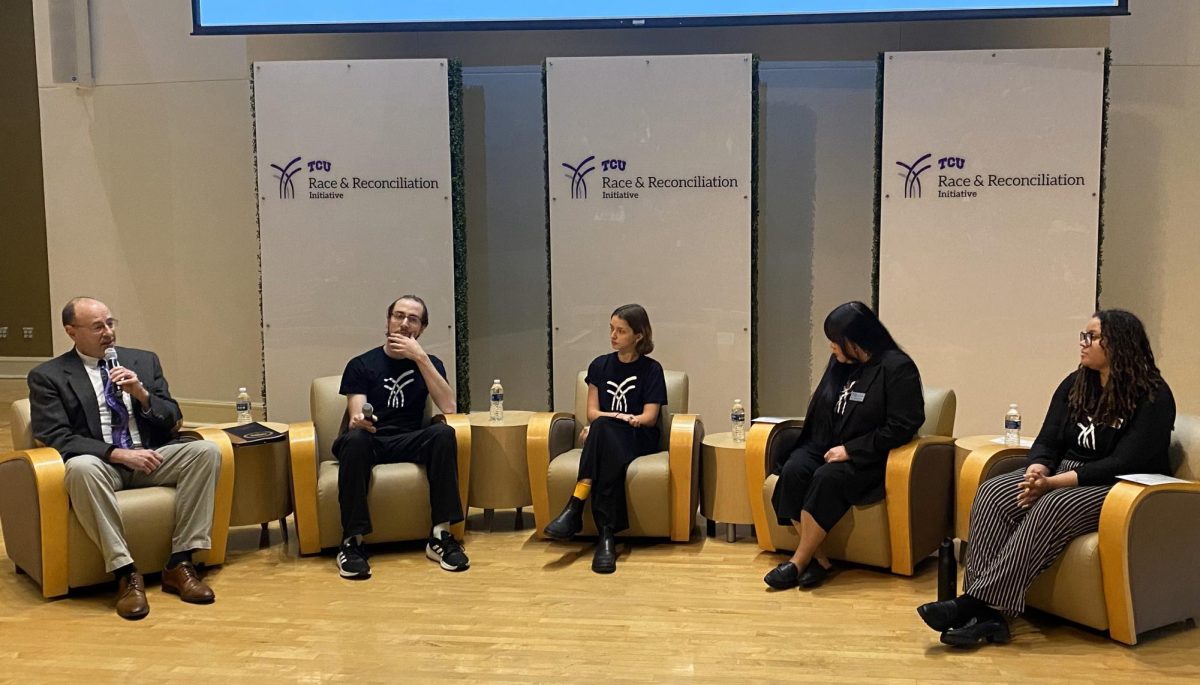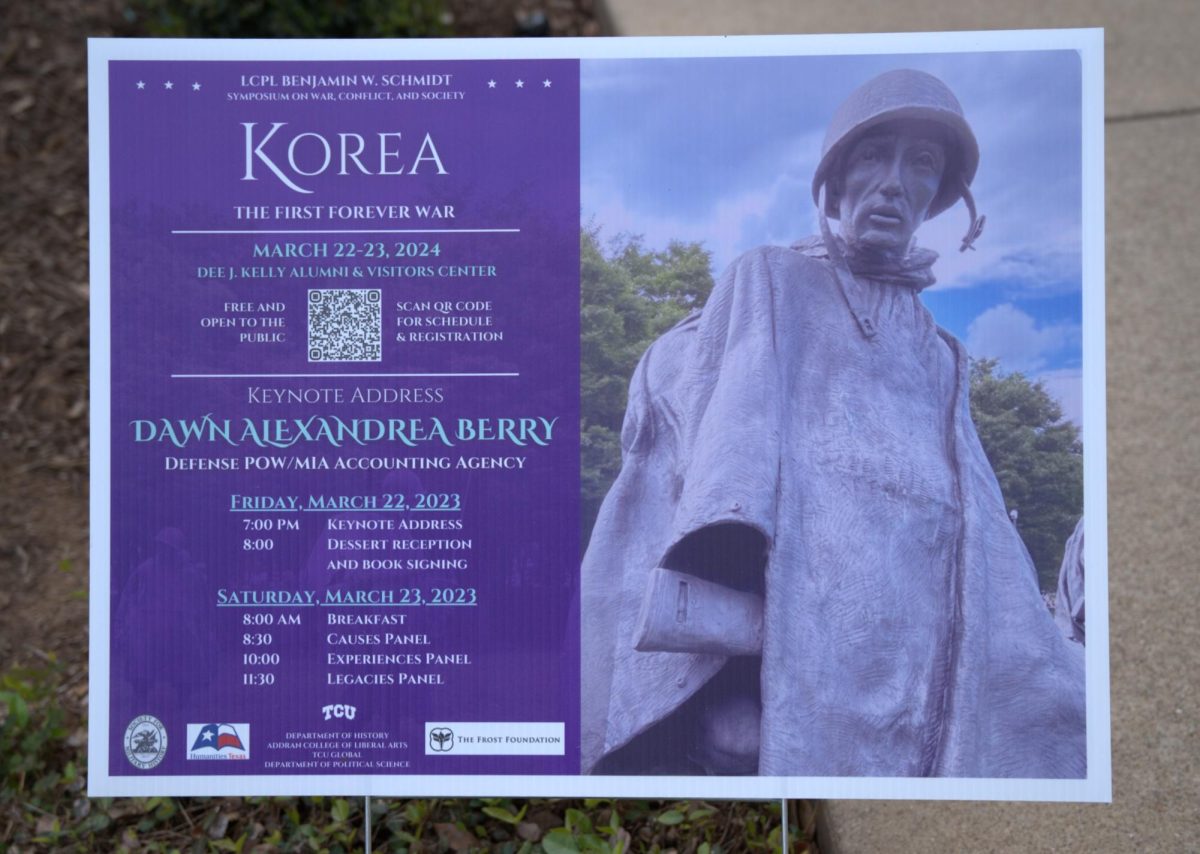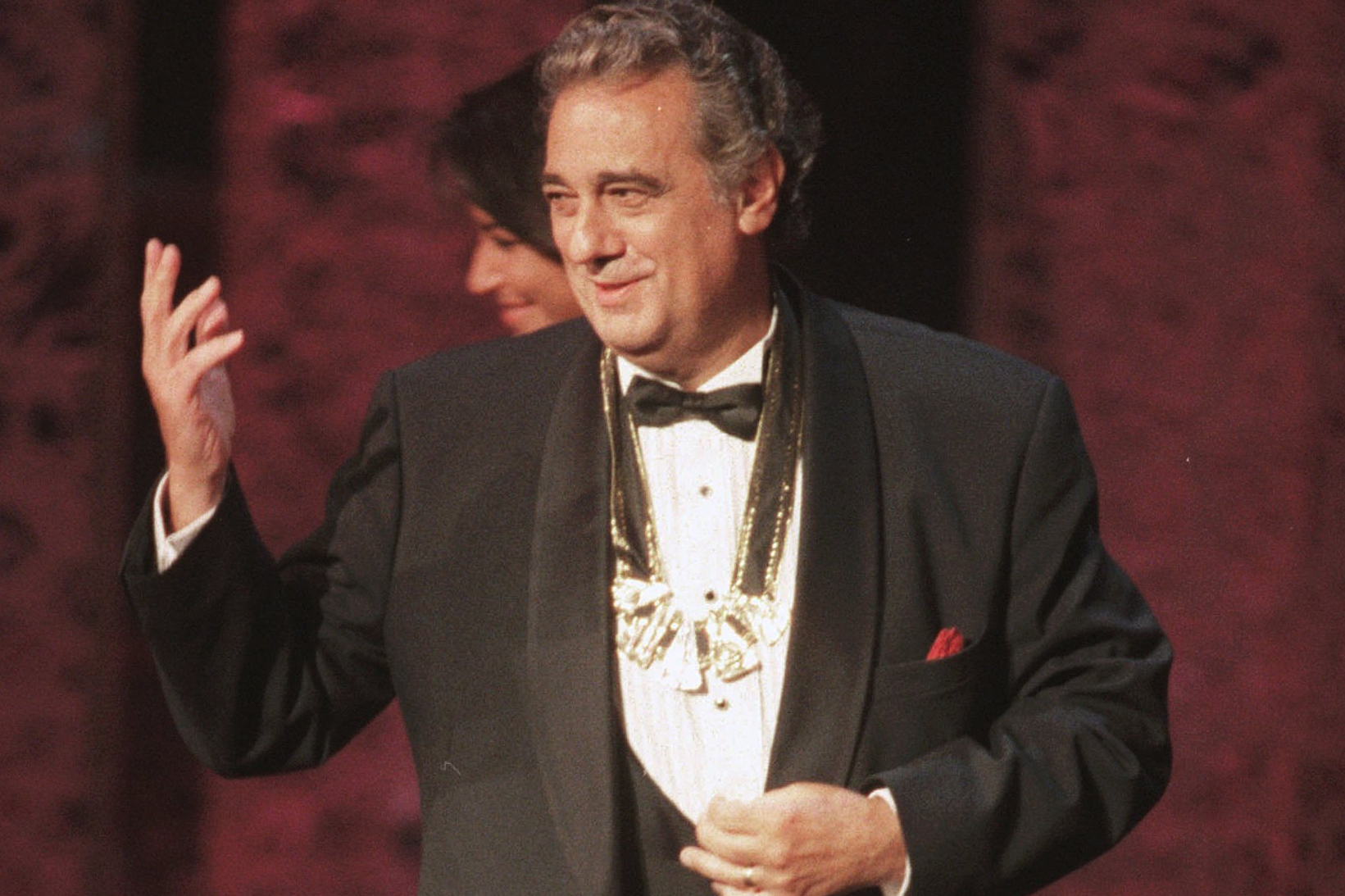
Editor’s Note: TCU 360 reached out to Angela Turner Wilson, but she declined to comment.
The glittering production was a high point of the Washington Opera’s 1999-2000 season: Jules Massenet’s “Le Cid,” about a legendary Spanish conqueror, starring a tenor legendary in his own right — Placido Domingo, then the company’s artistic director.
The opera, also being filmed for broadcast on public television, was unquestionably a career break for a 28-year-old singer named Angela Turner Wilson, an associate professor of professional practice in the TCU College of Fine Arts who’d been cast as the second female lead and was singled out for praise in reviews. “I knew this was the start of big things for me,” she says now.
But one evening before a performance, she said, she and Domingo were having their makeup done together when he rose from his chair, stood behind her and put his hands on her shoulders. As she looked at him in the mirror, he suddenly slipped his hands under her bra straps, she said, then reached down into her robe and grabbed her bare breast.
“It hurt,” she told The Associated Press. “It was not gentle. He groped me hard.” She said Domingo then turned and walked away, leaving her stunned and humiliated.
Wilson, now 48 and a college voice teacher in the Dallas area, was one of 11 women to come forward after an Aug. 13 AP story in which numerous women accused the long-married, Spanish-born superstar of sexual harassment or inappropriate, sexually charged behavior and of sometimes damaging their careers if they rejected him.
In the weeks since that story was published, the women have shared new stories about encounters with Domingo, currently the general director of Los Angeles Opera, that they said included unwanted touching, persistent requests for private get-togethers, late-night phone calls and sudden attempts to kiss them on the lips.
Several additional backstage employees described for the AP how they strove to shield young women from the star as administrators looked the other way.
Taken together, their stories reinforce a picture of an industry in which Domingo’s behavior was an open secret and young women were left to fend for themselves in the workplace.
Domingo’s spokeswoman issued a statement disputing the allegations but provided no specifics.
“The ongoing campaign by the AP to denigrate Placido Domingo is not only inaccurate but unethical. These new claims are riddled with inconsistencies and, as with the first story, in many ways, simply incorrect,”
The AP obtained a copy of an email sent Thursday to LA Opera employees saying that administrators, who hired outside counsel to investigate after the initial accusations, “are very troubled by the ongoing allegations raised by the Associated Press, and take them very seriously.” The email noted that Domingo would not be involved in day-to-day management until the investigation concluded and asked employees not to comment publicly.
Thursday evening the Dallas Opera announced it had canceled a March 2020 gala in which Domingo was scheduled to perform. The opera’s statement cited “ongoing developments regarding allegations” against Domingo.
Washington National Opera issued a statement saying it was “disturbed and disheartened” by the new allegations, but did not say whether it planned to investigate them.
Wilson said she was spurred to come forward after the 78-year-old Domingo’s reaction to the AP’s initial story, in which he said he believed his actions “were always welcomed and consensual” and added that “the rules and standards by which we are — and should be — measured against today are very different than they were in the past.”
Wilson rejects the idea that such behavior has ever been acceptable.
“What woman would ever want him to grab their breast? And it hurt,” she said. “Then I had to go on stage and act like I was in love with him.”
Melinda McLain, who was the production coordinator at LA Opera for its inaugural season in 1986-87 and also worked at the Houston Grand Opera with Domingo, told the AP she made it a point not to put Domingo in rehearsal rooms alone with young female singers, even if he specifically requested it, and also tried to supply him with male dressers.
“We created these elaborate schemes for keeping him away from particular singers,” McLain said. “I never would have sent any woman of any sort into his dressing room.”
McLain said another strategy was to invite Domingo’s wife, Marta, to attend company parties “because if Marta was around, he behaves.”
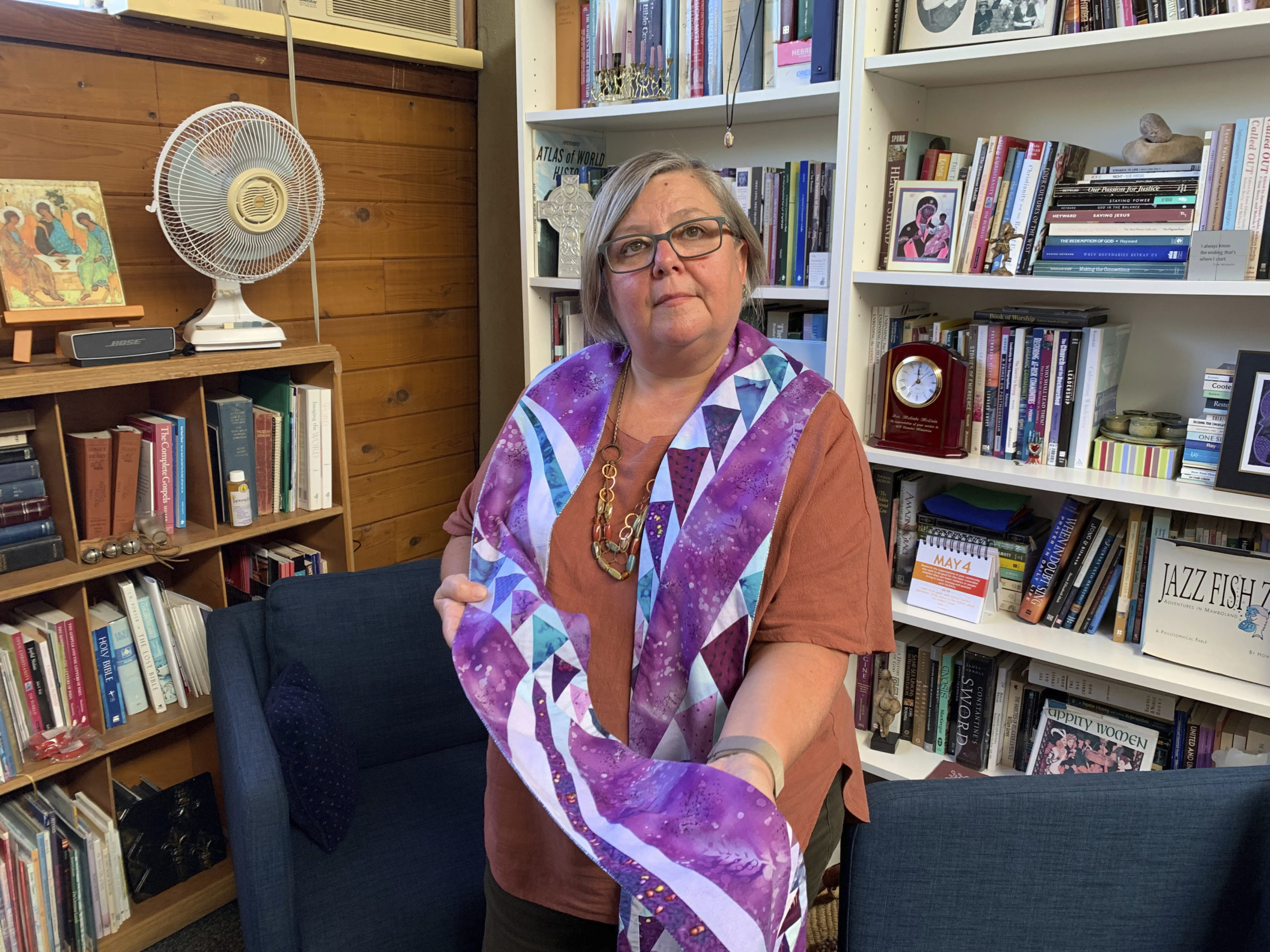
Several people who have worked in the costume department of the LA Opera, where Domingo has served in various capacities since the 1980s, said his backstage behavior was common knowledge and that management had been aware of it for years. One employee said her colleagues tried to steer clear of sending women into fittings with Domingo as recently as the 2016-2017 season.
“I was told by my direct boss that they avoided sending any sort of attractive young woman into a fitting with him because of his behavior,” said one employee who requested anonymity because she is still in the opera industry and fears repercussions. She said Domingo was known for “getting too close, hugging, kissing, touching and being physically affectionate.”
Another costume employee described narrowly avoiding a wet kiss on the lips from Domingo by turning her head at the last minute so it landed on the side of her mouth. She said she reported it to a supervisor who told her to avoid being alone with Domingo.
The need for women to come up with their own avoidance strategies just to get their jobs done is a classic example of a sexually hostile work environment, a key legal component of sexual harassment, experts note.
Wilson was the only new accuser to speak to the AP on the record. The others requested anonymity because they still work in the industry and said they feared recriminations in a world long dominated by Domingo and other powerful men.
One established soprano said she feared not only for herself but for her husband, who also works in opera. Others spoke of wanting to protect an art form that is struggling to remain relevant in the U.S. And some said vocal support for Domingo in Europe — and skepticism of the women’s accusations — has made them more fearful of coming forward publicly.
Domingo’s sometimes brazen backstage pursuits were an open topic of discussion, according to a number of singers and others in the industry.
One former LA Opera staffer said Domingo once backed her up against a wall, grasped her hand and whispered into her ear as her male boss looked on awkwardly. Someone should have told Domingo it was inappropriate, she said, “but it shouldn’t be the girl in the hallway on a headset trying to do her job.”
The employee said wardrobe staff had a joke about spraying female singers “with tenor spray, like bug spray, to keep the tenors off you.”
Some of the women told the AP that avoidance strategies included asking Domingo about his grandchildren to distract him and giggling awkwardly and pretending they didn’t quite understand when he asked for their phone numbers or suggested they meet somewhere.
Baritone Robert Gardner said he was surprised the star’s behavior hadn’t become public sooner “given his reputation inside the industry.”
Gardner contacted the AP to say he witnessed Domingo’s behavior with mezzo-soprano Patricia Wulf, who previously was the only accuser willing to be identified by name. Wulf worked with Domingo and Gardner in 1998 at Washington Opera, where the legend also served as general director, and the baritone confirmed that the star persistently propositioned her.
“I saw him positioning himself and maneuvering around rehearsal rooms and in the hallway to get close to her, and she was clearly avoiding him,” Gardner said.
Wulf told the AP that Domingo would confront her night after night when they performed together with the same whispered question, uttered very close to her face: ”‘Patricia, do you have to go home tonight?’”
Though she strenuously tried to avoid him, she said his pursuit seemingly had no bounds and that she feared leaving her dressing room if he was in the hallway. Though Domingo did not physically touch her, she said there was no mistaking his intentions.
Both Wulf and Angela Turner Wilson said they did not report the star’s behavior to management, fearing they wouldn’t be believed and that they would be the ones penalized.
Wilson told the AP she was aware of Domingo’s reputation by her third season at Washington

There were frequent invitations, Wilson said — to come to his apartment to watch a video of a role he wanted her to sing. To go to dinner. Just the two of them.
“I would say ‘No, maestro.’ I said that a lot. I felt like if I put ‘maestro’ on it, it would still be respectful,” she said.
“I stuck to no — ’No, I won’t meet you. No, I won’t go with you upstairs to your apartment. No, no, no.”
Not long after performances started Oct. 30, she said he came to her dressing room and entered without knocking, saying he wanted to wish her a good show. Then, she said, he added: “I need a kiss. It’s a demanding role. I need a kiss for strength.”
Wilson said she declined, again reminding him she was married, but he continued to insist.
“I remember thinking ‘I have to get to the door,’” she said. “I started to open the door and he slammed the door with his foot and his hand and kept his hand on the door and he said, ‘I need that kiss.’ And he wouldn’t let me out.”
“I said, ‘I’ll make you a deal. You can kiss my cheek’ So he kissed me on my cheek. And then he left. And it scared me so badly. I went back to my dressing table and was shaking. I remember thinking, ‘Now I’m in trouble. How am I going to manage him now?’”
For the rest of the run, she said, “I would lock my dressing room door. My dresser would tell me if he was outside. She would tell me if he was in the hall and if it was safe.”
Later in the show’s November run, Wilson said she was scheduled to have her makeup done alongside Domingo, which “I thought was strange. … Usually, big stars, especially headliners, get their makeup done in their dressing room.” But she said was reassured by the fact that the makeup person was also present and the door to the room was open.
She said that when Domingo first placed his hands on her shoulders, it merely seemed friendly.
“I didn’t think I was in jeopardy,” she said. “We were having a friendly conversation. … It just came out of nowhere. It wasn’t like he was complimenting me or seducing me or anything, where I would think I need to be on guard.”
She said that after he grabbed her breast, she cried out in pain and asked the makeup person, “Did you see that?” Reached by the AP, the makeup artist said he did not recall the incident and did not want to comment further on the record.
She said she called her husband and her parents that night — and also the night he tried to kiss her — and all three confirmed to the AP that she was upset and in tears when she related to them what happened.
Wilson provided the AP with copies of a journal she kept at the time that notes rehearsals for “Le Cid” began Oct. 4, 1999. In an entry a month later, she wrote that Domingo “has told me several times how happy he was with my singing,” but also “he hits on me all the time.” She added, ’Please God don’t let it get any worse.”
The next season, she said she had three roles but that Domingo barely talked to her or acknowledged her.
Though she won the company’s prestigious Artist of the Year award that season, in 2000, she said the Washington Opera never again hired her, which she attributes to her interactions with Domingo.
“Anybody who gets ‘singer of the year’ at that company or any company looks at it as a ticket to a relationship with that company,” she said. “It’s saying you have done good work and deserve to come back. It’s not usually a farewell.”
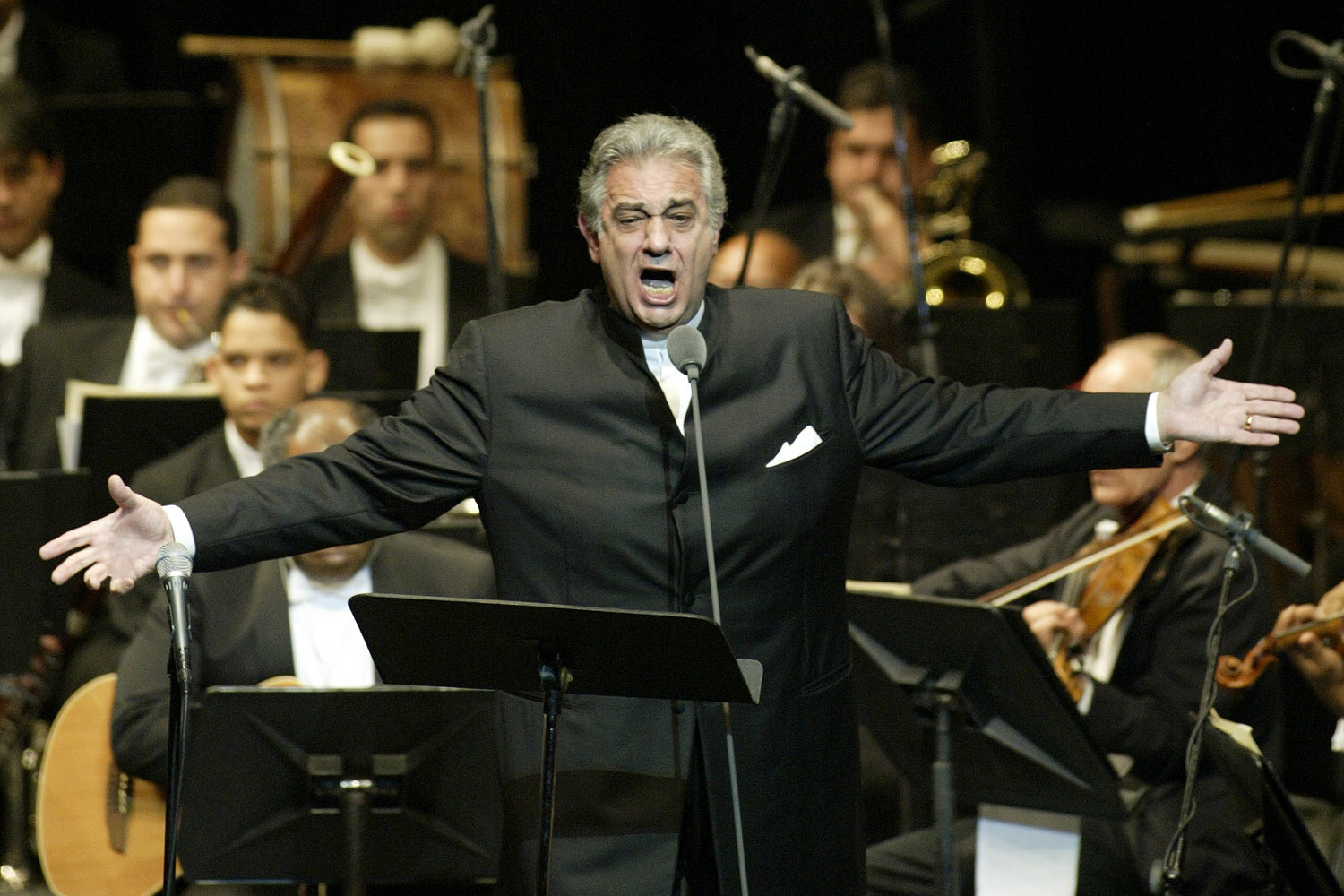
Her career lasted another decade before she switched mainly to teaching. She sang three seasons at the New York City Opera and at other venues around the country, including the Dallas Opera and Boston Lyric Opera. She also performed at a state dinner at the White House during the Clinton administration and at the opening of George W. Bush’s presidential library.
A number of the women who criticized Domingo’s behavior also expressed a lingering admiration for the star, calling him charismatic and generous, with a knack for remembering everyone’s name, and someone who has made indelible contributions to the industry.
Wilson said she realizes it’s hard for many among his legions of admirers to come to terms with stories of his sexually aggressive actions.
“It would be hard as a fan to justify or rationalize how somebody so charming and generous in so many ways could be this person,” she said.
For years, Wilson said she remained silent about her experiences with Domingo “because I felt that nobody else would say anything.” But when she read the initial AP story, she said she realized something could be done.
“I know if I miss this opportunity and move on in silence, I will feel 20 times worse,” she said. “It’s a big burden to carry around through your life. And every time another #MeToo story comes out, I go into a dark place, and I’m tired of it.”
She said she also came forward for the sake of the young women she now teaches as the chair of a university voice department.
“The music, the art, is so wonderful,” she said, “and I wish the business could at least have the integrity to give these young women a fair shot.”


